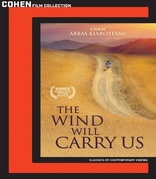The Wind Will Carry Us Blu-ray Movie
HomeThe Wind Will Carry Us Blu-ray Movie 
Bad ma ra khahad bordCohen Media Group | 1999 | 118 min | Not rated | Jul 22, 2014
Movie rating
7.4 | / 10 |
Blu-ray rating
| Users | 0.0 | |
| Reviewer | 4.5 | |
| Overall | 4.5 |
Overview
The Wind Will Carry Us (1999)
The arrival of an engineer and his colleagues from Tehran in a remote village in Iranian Kurdistan. Assumed by the locals – with whom they form an ambivalent relationship – to be archaeologists or telephone engineers, the visitors’ behaviour and keen interest in the health of an ailing old woman seem strange and their true motives are shrouded in mystery.
Starring: Bahman Ghobadi, Behzad DoraniDirector: Abbas Kiarostami
| Drama | Uncertain |
| Foreign | Uncertain |
Specifications
Video
Video codec: MPEG-4 AVC
Video resolution: 1080p
Aspect ratio: 1.85:1
Original aspect ratio: 1.85:1
Audio
Farsi: LPCM 2.0
Subtitles
English
Discs
50GB Blu-ray Disc
Single disc (1 BD)
Playback
Region A (locked)
Review
Rating summary
| Movie | 4.5 | |
| Video | 4.0 | |
| Audio | 4.0 | |
| Extras | 4.0 | |
| Overall | 4.5 |
The Wind Will Carry Us Blu-ray Movie Review
See. Hear. Now.
Reviewed by Jeffrey Kauffman July 24, 2014Richard Alpert was a well respected Harvard professor who became infamous when his research with Timothy Leary into the therapeutic effects of psychedelic drugs like LSD and psilocybin landed both of the once august teachers on the unemployment line. Alpert continued his quest into mystical topics for the rest of the sixties, including a pilgrimage to India. A few years after his dismissal from Harvard he was gifted by his guru with the spiritual name of Ram Dass (“servant of God”) and authored what many consider to be the seminal tome of what would ultimately become known as New Age philosophy, the 1971 opus Be Here Now. That three word maxim seemed to sum up the (already dying?) hippie philosophy of remaining in the present moment, not letting past peccadilloes weigh down the soul and certainly not worrying about what tomorrow might bring. Alpert’s title might not have the negative connotations of the famous aphorism found in the Gospel of Matthew (“Take therefore no thought for the morrow: for the morrow shall take thought for the things of itself. Sufficient unto the day is the evil thereof.”), and his fostering of the idea of residing in the now seemed to be a joyous formulation that was repeated by thousands of global acolytes as an unabashedly religious mantra. While the very fact that something at least similar to “be here now” had appeared in the Bible thousands of years before Alpert coined his famous phrase serves as proof of the longevity of the concept, many Westerners who didn’t dabble in Eastern mysticism probably couldn’t have cared less that much the same idea runs rampant through all sorts of regional religious texts and even more secular offerings like stories and poems. That ethos is a deep seated facet of Iranian lore, and it is front and center in the often hypnotic 1999 film by Iran’s master filmmaker Abbas Kiorastami. Despite having received rapturous reviews not just for this film, but for his previous works like Taste of Cherry, Kiorastami remains almost shockingly unknown (or at least underappreciated) by even those who consider themselves well informed cineastes. That tendency is supported by the fact that while The Wind Will Carry Us was ostensibly released in 1999, it took several more years for the film to be fully appreciated by the global critical community. This new Cohen release will hopefully help the film and Kiorastami to achieve a larger body of appreciators.
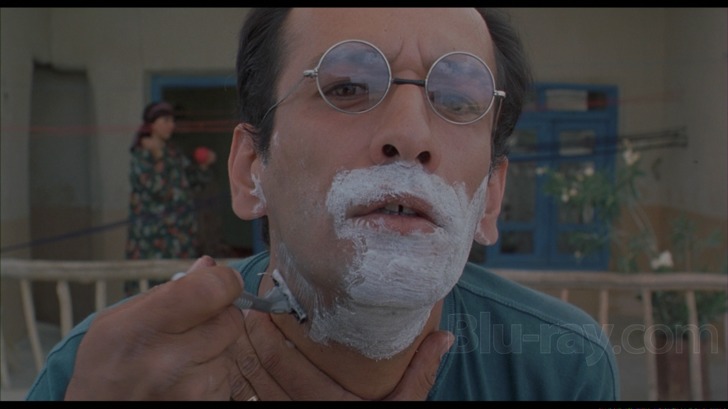
The famous French phrase fin de siecle refers not just to the passage of centuries, but to a certain amount of ennui (another French term, of course) that seems to accrue as people observe a patently arbitrary division in time highlighted by a major change in our numbering system. This tendency was perhaps only exacerbated by the immanence of the new millennium in 2000 (yes, maybe it really started in 2001, but that’s a debate for another day). There’s a languorous quality to The Wind Will Carry Us that seems to suggest that time itself is an illusion, and therefore any anxiety about an arbitrary division is pointless and perhaps even absurd. If time doesn’t exist, isn’t it that much easier to remain firmly rooted in the present? Still, there's a melancholy undertow to much of The Wind Will Carry Us that seems perfectly in tune with its fin de siecle genesis.
Kiorastami often maintains an observational distance from his characters, and that remains true in The Wind Will Carry Us, a film that in its own way is as aphoristic as any famous idiom found in any global religious text. The first scene in the film sets up this ambience perfectly: we see a comically isolated car wending its way through a series of dusty switchbacks in a completely deserted rural Iranian landscape while unseen voices in the car discuss whether or not they’re hopelessly lost. It’s notable that many of the “main” characters in the film are never even seen—we hear them occasionally, and they’re referred to by the one central character we do see, but aside from one or two wide shots, they remain out of frame, offering an enigmatic invisibility that is still palpably felt within the confines of the film’s minimalistic plot. This approach makes the film's sound design incredibly important. Commentator Jonathan Rosenbaum mentions how Kiorastami once told him that he prefers to have sound rather than image impart information in his films (certainly a somewhat ironic stance for someone exploiting a so-called "visual" medium), and The Wind Will Carry Us provides at least as much to listen to as it does to view.
That focal character is never overtly named, but he’s referred to as the Engineer (Behzad Dorani). He and his crew have traveled hours from Tehran to arrive at a small Iranian village which is folded into a hillside like the Native American habitats that can still be seen in places like Mesa Verde. What are these interlopers doing in this remote location? Kiorastami never explicitly details what’s going on. Commentators Jonathan Rosenbaum and Mehrnaz Saeed-Vafa aver that the Engineer is a documentary filmmaker (supposedly there to document the mourning rites for a centenarian who's expected to die at any moment), and while the Engineer does indeed ask for his camera at one point in the film, the actual information presented in the film leaves the actual intent of these outsiders largely up to the audience to infer. This is a film which is content to hint rather than explicate, and that tendency gives The Wind Will Carry Us an inherently otherworldly and mystical ambience, something that contrasts ironically with the rustic, even primitive, realities of the villagers' everyday lives.
But really why the Engineer and the largely unseen others are there is secondary to what The Wind Will Carry Us is about. And this is a film that is about both nothing and everything. It is positively Seinfeld-ian in its emphasis on the picayune, but it is also astoundingly profound in small moments that explore what it means to be alive and to face one’s mortality. This is all set against the quiet but visceral clash between modernity, as personified by the Engineer, and the sort of ancientness that seems to laugh in the face of progress (despite the occasional television antenna sticking up from mud wattle walls).
The Wind Will Carry Us is not a film for those who require huge plot and/or character arcs. This is instead an almost subliminally meditative piece, one which wends its way into the subconscious, much like that car we first see trekking ever deeper into the Iranian countryside. In our current sociopolitical climate, Iran has been demonized to such a point that it’s often hard to remember its august artistic heritage. That may at least help to explain why Abbas Kiorastami continues to be relatively unknown, despite a career that certainly places him in the very highest echelons of contemporary filmmakers. The Wind Will Carry Us is an incredibly evocative piece that doesn’t browbeat its audience, but which, like a gentle but insistent summer breeze, reminds the patient and alert viewer (and listener) to the swirl of profound mysteries encircling anyone with the eyes to see and ears to hear.
The Wind Will Carry Us Blu-ray Movie, Video Quality 
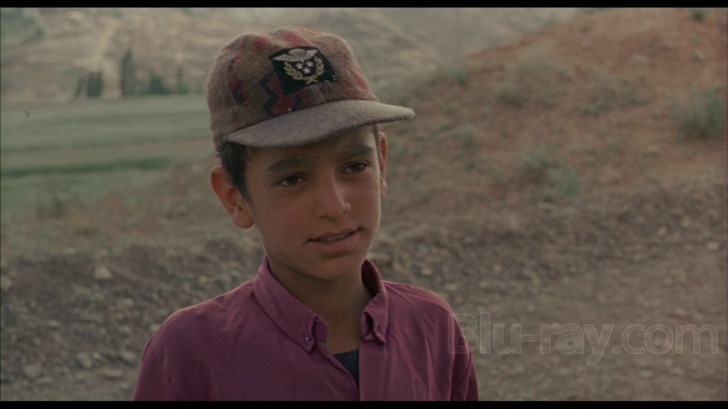
The Wind Will Carry Us is presented on Blu-ray courtesy of Cohen Film Collection with an AVC encoded 1080p transfer in 1.85:1. Those who have seen the film in previous home video incarnations may initially feel like this is something of a disappointment, though I would caution a careful examination of such sentiments. While the palette here is a good deal cooler, even drab, than on DVD editions of the title, those DVD editions seem (to my eyes, anyway) to suffer from artificial color and contrast boosting. Here, things are a good deal more subtle, with a range of beiges and browns in the general backgrounds (and even in the village) that looks accurate, if not overwhelmingly vivid. As Rosenbaum mentions in his commentary, Kiarostami only very rarely indulges in close-ups, and so fine detail is somewhat mitigated. That said, when there are close-ups, detail is at very good if not outstanding levels (see screenshot 1). Contrast and black levels are generally quite strong here, though some of the low light sequences (including an important segment inside an almost totally black room) lack significant shadow detail. Despite some telecine wobble evident in the opening credits, the rest of the image remains stable. Fine grain is natural looking and consistent.
The Wind Will Carry Us Blu-ray Movie, Audio Quality 
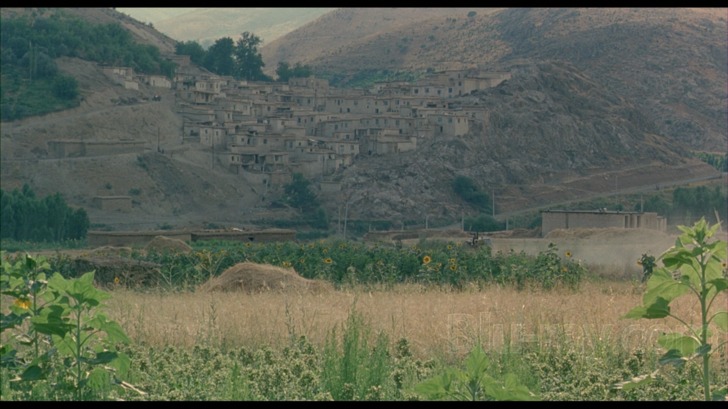
The Wind Will Carry Us features an LPCM 2.0 track in Farsi. Sound design here is paramount, even if it is largely subtle and nuanced, and this track supports everything with excellent fidelity, if an attendant narrowness at times. Dialogue is presented very cleanly and clearly, and the ambient environmental effects are extremely well prioritized, adding a bit of depth to the proceedings. The track exhibits no issues of any kind to warrant worry.
The Wind Will Carry Us Blu-ray Movie, Special Features and Extras 
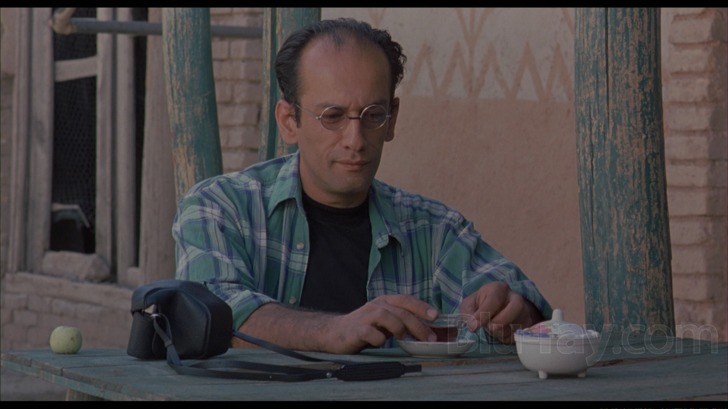
- Feature Length Audio Commentary by Critic Jonathan Rosenbaum and Scholar Mehrnaz Saeed-Vafa, 2014. Rosenbaum was one of the first champions of Kiarostami in general and this film in particular, and his passion comes through quite clearly. What doesn't always come through clearly is Saeed-Vafa, whose heavily accented English is sometimes just a bit difficult to understand. That minor quibble aside, though, this is an absolutely top notch commentary that delivers background, context and even some philosophical musings which are most interesting.
- The Poetry of Cinema: Abbas Kiarostami in Conversation with Richard Pena, 2014 (1080p; 1:29:10) is a far reaching dialogue held at Indiana University Cinema in Bloomington. Kiarostami's entire career comes under review, and there's some really interesting content here that folds into the tumultuous history of Iran over the past several decades.
- 2014 Theatrical Re-Release Trailer (1080p; 2:03)
The Wind Will Carry Us Blu-ray Movie, Overall Score and Recommendation 
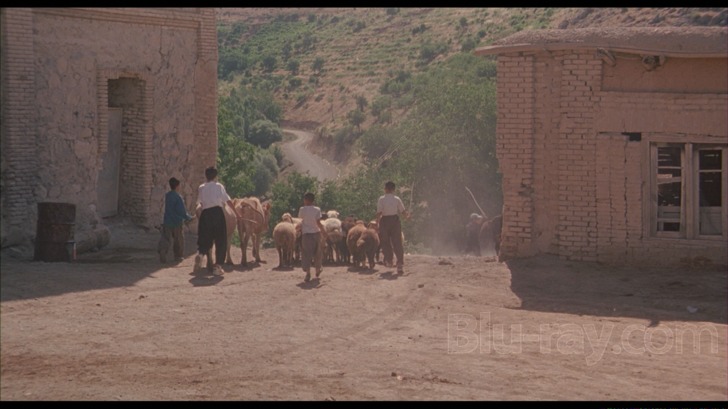
Let The Wind Will Carry Us carry you away into its dreamlike yet still kind of gritty ambience, and chances are you will discover one of the master filmmakers of our age (if you're not already aware of Abbas Kiarostami). The interplay between Behzad Dorani as the Engineer and Farzad Sohrabi as the (adorable) little boy who becomes his tourguide around the village is sweet, but there's more enigmatic content available with regard to some of the grown up villagers. The Wind Will Carry Us is intentionally discursive and doesn't give up its secrets easily, but it's one of the most purely evocative films you're likely to see this (or any) year. Highly recommended.
Other editions
The Wind Will Carry Us: Other Editions
Similar titles
Similar titles you might also like

Beyond the Hills
După dealuri
2012

Le beau Serge
1958

Once Upon a Time in Anatolia
Bir Zamanlar Anadolu'da
2011

About Dry Grasses
Kuru Otlar Üstüne
2023

The Only Son
一人息子
1936

A Touch of Sin
天注定 / Tian zhu ding
2013

La Promesse
1996

Winter Sleep
Kış Uykusu
2014

Graduation
Bacalaureat
2016

The Banishment
Izgnanie
2007

In the Fog
V tumane
2012

Pather Panchali 4K
পথের পাঁচালী / Song of the Little Road
1955

Evil Does Not Exist
悪は存在しない
2023

Mademoiselle
1966

Winter Light
Nattvardsgästerna
1963

The Wild Pear Tree
Ahlat Ağacı
2018

Broker
브로커 / Beulokeo
2022

Cemetery of Splendor
2015

Ordet
1955

Il Posto
1961
